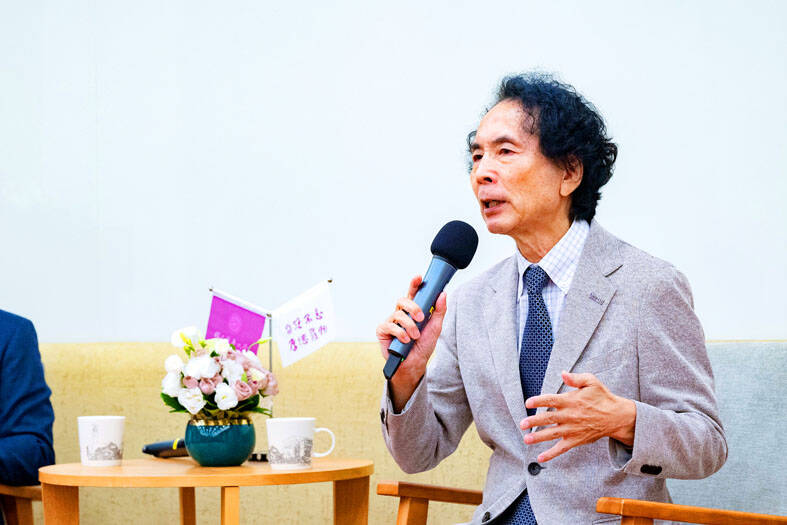The decade-long political advantage of the governing Democratic Progressive Party (DPP) has come to an end, National Tsing Hua University honorary chair professor Yoshiyuki Ogasawara said on Saturday.
Referring to the mass recall campaign mostly targeting Chinese Nationalist Party (KMT) lawmakers and an opposition-backed referendum on restarting the Ma-anshan Nuclear Power Plant in Pingtung County, Ogasawara said that the “summer battle” ended with “a major defeat for the DPP and a major victory for the opposition parties.”
The losses bring to an end the DPP’s relative advantage from 2014 to last year, the political scientist wrote in Japanese on Facebook.

Photo: Hung Mei-hsiu, Taipei Times
During that period, the DPP won all three presidential elections (in 2016, 2020 and last year) and control of the legislature twice (in 2016 and 2020).
Ogasawara said the DPP must reconstruct its core narratives of “resisting China and safeguarding Taiwan” and creating a “nuclear-free homeland.”
However, the opposition parties “cannot rely only on being anti-DPP,” he said, as that alone might not bring about a transfer of power.
Saturday’s referendum, initiated by the Taiwan People’s Party and supported by the KMT, asked voters whether they wanted to restart the Ma-anshan Nuclear Power Plant, which was shut down in May. The DPP opposed the measure.
The referendum resulted in more than 4.34 million votes in favor (74.2 percent of participating voters), against more than 1.51 million votes against (25.8 percent). However, the votes in favor failed to meet 25 percent threshold of registered voters, or about 5 million votes, needed to pass.
Turnout was 29.5 percent, down from 41.1 percent in the 2021 referendums, when four questions were put to voters.
Recall elections against seven KMT lawmakers all failed by relatively wide margins.
Overall turnout in the seven districts was 49.3 percent, compared with 56.1 percent turnout for last month’s recall elections against 24 KMT lawmakers, figures that could be interpreted as showing a decline in the willingness of DPP supporters to vote, Ogasawara said.
The outcome of Saturday’s recalls had already been decided on July 24, when the first wave of recalls failed, he said.
The referendum vote showed that an “overwhelming majority” of Taiwanese would like the ruling party to change its “nuclear-free homeland” stance, he said.
Opposition to nuclear energy was stronger in the 2010s, but has weakened in the past few years due to high electricity demand from the semiconductor industry, delays in renewable energy and increased reliance on thermal power, he said.
Concerns over environmental and corruption issues surrounding solar panels further raised public unease, he added.
Ogasawara has been “researching Taiwanese politics for more than 30 years and has accurately predicted the results of Taiwan’s general elections several times,” National Tsing Hua University’s Web site says.

Taiwan has received more than US$70 million in royalties as of the end of last year from developing the F-16V jet as countries worldwide purchase or upgrade to this popular model, government and military officials said on Saturday. Taiwan funded the development of the F-16V jet and ended up the sole investor as other countries withdrew from the program. Now the F-16V is increasingly popular and countries must pay Taiwan a percentage in royalties when they purchase new F-16V aircraft or upgrade older F-16 models. The next five years are expected to be the peak for these royalties, with Taiwan potentially earning

POSITIVE DEVELOPMENT: Japan and the US are expected to hold in-depth discussions on Taiwan-related issues during the meeting next month, Japanese sources said The holding of a Japan-US leaders’ meeting ahead of US President Donald Trump’s visit to China is positive news for Taiwan, former Japan-Taiwan Exchange Association representative Hiroyasu Izumi said yesterday. After the Liberal Democratic Party’s landslide victory in Japan’s House of Representatives election, Japanese Prime Minister Sanae Takaichi is scheduled to visit the US next month, where she is to meet with Trump ahead of the US president’s planned visit to China from March 31 to April 2 for a meeting with Chinese President Xi Jinping (習近平). Japan and the US are expected to hold in-depth discussions on Taiwan-related issues during the

‘LIKE-MINDED PARTNER’: Tako van Popta said it would be inappropriate to delay signing the deal with Taiwan because of China, adding he would promote the issue Canadian senators have stressed Taiwan’s importance for international trade and expressed enthusiasm for ensuring the Taiwan-Canada trade cooperation framework agreement is implemented this year. Representative to Canada Harry Tseng (曾厚仁) in an interview with the Central News Agency (CNA) said he was increasingly uneasy about Ottawa’s delays in signing the agreement, especially as Ottawa has warmed toward Beijing. There are “no negotiations left. Not only [is it] initialed, we have three versions of the text ready: English, French and Mandarin,” Tseng said. “That tells you how close we are to the final signature.” Tseng said that he hoped Canadian Prime Minister Mark Carney

STAY IN YOUR LANE: As the US and Israel attack Iran, the ministry has warned China not to overstep by including Taiwanese citizens in its evacuation orders The Ministry of Foreign Affairs (MOFA) yesterday rebuked a statement by China’s embassy in Israel that it would evacuate Taiwanese holders of Chinese travel documents from Israel amid the latter’s escalating conflict with Iran. Tensions have risen across the Middle East in the wake of US and Israeli airstrikes on Iran beginning Saturday. China subsequently issued an evacuation notice for its citizens. In a news release, the Chinese embassy in Israel said holders of “Taiwan compatriot permits (台胞證)” issued to Taiwanese nationals by Chinese authorities for travel to China — could register for evacuation to Egypt. In Taipei, the ministry yesterday said Taiwan